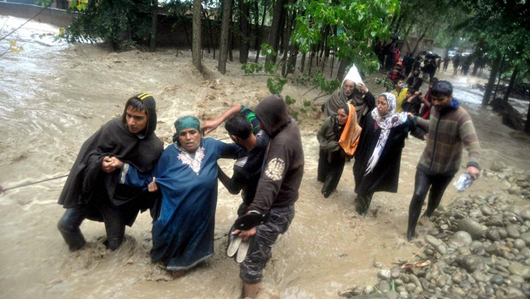
Jammu, Sep 6: The flood situation in Jammu and Kashmir continued to worsen on Saturday, with the death toll mounting to 100 while rescuers struggled to evacuate thousands of people to safety as major rivers and streams were in spate due to incessant rains.
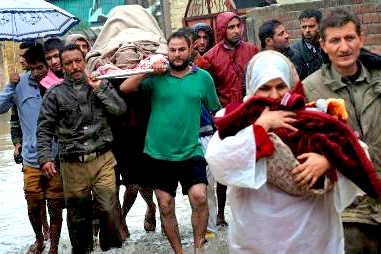 Home minister Rajnath Singh held a meeting with chief minister Omar Abdullah to take stock of the flood situation soon after he arrived this morning in Srinagar but could not undertake an aerial survey due to inclement weather.
Home minister Rajnath Singh held a meeting with chief minister Omar Abdullah to take stock of the flood situation soon after he arrived this morning in Srinagar but could not undertake an aerial survey due to inclement weather.
Omar himself drove Rajnath Singh, who was accompanied by minister of state in PMO Jitendra Singh, through the Srinagar city which was experiencing heavy rainfall.
In Jammu region, 11 more deaths were reported on Saturday, including seven in two house collapse incidents in Udhampur. Four more bodies were recovered from Thursday's bus mishap in which 63 members of marriage party were washed away in Rajouri district, SSP Rajouri Mubasir Latiffe said, adding a total of 29 bodies have been recovered so far.
At least nine army personnel including an officer were trapped in strong water current on Saturday, as their boat capsized during a rescue operation in Pulwama district, where River Jhelum has breached embankment prompting authorities to issue a red alert for people living in low lying areas of south Srinagar.
"We have launched an operation to rescue the missing personnel," an army official said, adding, "Despite facing dangers to personal safety, the army personnel are out there to provide relief to the civilian population of Kashmir."
A total of 100 people have died in the state hit by floods and land slides due to incessant rains since Wednesday. While 89 people have been killed in Jammu, 11 have died in the Kashmir Valley so far.
In Jammu, authorities have closed four bridges connecting two parts of city after they suffered damage due to River Tawi flowing above the danger mark.
"The situation is very bad. It is becoming more critical as rains have not stopped making the rescue and relief operation difficult," officials said.
As many as 7000 people were rescued in various areas in Jammu by teams of Army and IAF teams till now with 85 columns (75-100 personnel each) of troops and Air Force helicopters taking part in the operations in the state.
Several rivers have been flowing above the danger mark and most parts of south Kashmir, including Pulwama, Anantnag and Kulgam districts have been submerged.
"Operation Megh Rahat in Jammu and Operation Sahayata launched by army in Jammu and Kashmir regions has moved on to next phase where army plans extensive deployment in support of flood relief," defence spokesperson Col SD Goswami said.
The deployment of helicopters, special divers, heavy engineering machinery and more personnel on ground will be the focus of army to assist locals in critical situations, that may arise due to heavy rains that are lashing the region, the spokesperson said.
Divisional commissioner, Kashmir, Rohit Kansal told PTI that Jhelum had breachedthe embankment at Kandizal in Kakapora area of Pulwama district.
"We have issued an alert for low lying areas of Srinagar city which are likely to get affected," he said.
Kansal said the areas likely to be affected by the breach include Lasjan, Mehjoor Nagar, Bud Shah Nagar and the strip along the vital Airport road.
"One unit of NDRF has been moved into these areas for carrying out evacuation and rescue operations wherever needed," he added.
Kansal appealed to people living in these areas to move out to safer places immediately.
Heavy and incessant rains since Wednesday have have disrupted normal life as large areas remain inundated.
The River Jhelum is flowing several feet above the danger mark at Sangam in Anantnag district of south kashmir, which has been inundated.
The threat of flood in other areas of the Valley including central Kashmir's Ganderbal district and three north Kashmir districts has also increased as all rivers and rivulets are flowing above the danger mark.
Authorities on Saturday sounded a red alert asking people living close to River Sindh to move to safer places following cloudbursts and flash floods in the higher reaches triggered by the continuous rains for the past five days.
River Sindh flows through most part of Ganderbal district and people in many areas live near the banks of the river.
"We have sounded a red alert in the district and asked people living near River Sindh to move to safer places as the water level in the river is increasing fast," Deputy Commissioner, Ganderbal, Sarmad Hafeez said.
He said cloudbursts in some areas in the upper reaches of the district during the night have resulted in flash floods and increase in the water levels of the river.
Rajouri district in Jammu region is the worst hit in terms of casualties. Thouands of peple have been rescued and evacuated to safety.
"We have set up temporary camps at several places for the displaced persons," the army officer added.
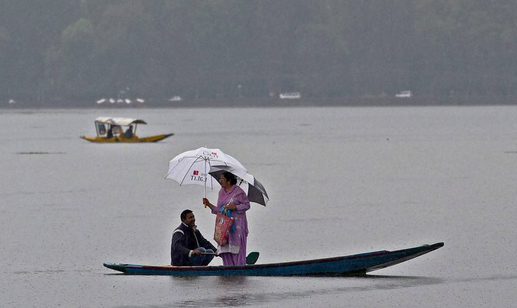
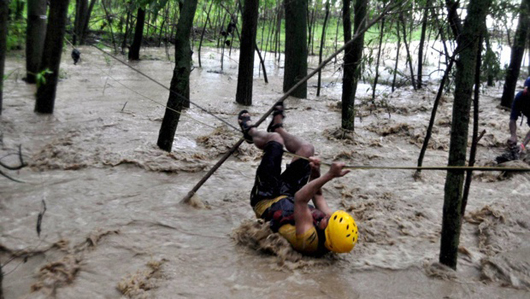
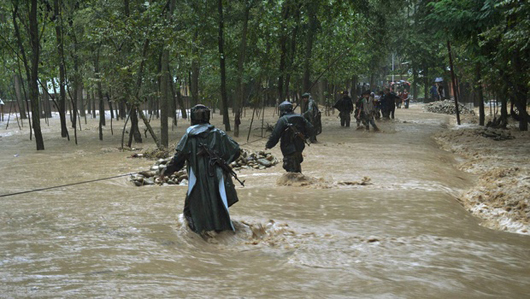






Comments
Add new comment